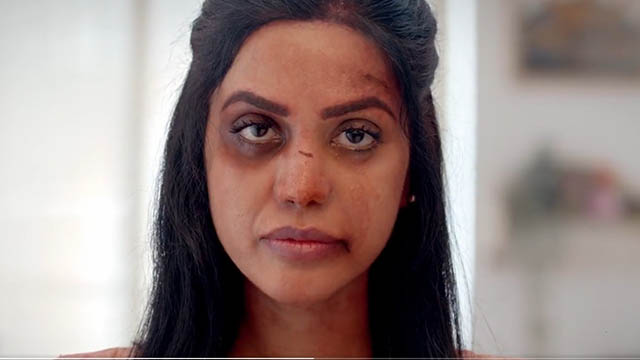A social message advertisement by the matrimonial website Bharat Matrimony stirred controversy on social media on Wednesday, March 8th. The 75-second-long video ad on the Hindu festival Holi, which coincided with International Working Women’s Day on March 8th, bears a social message about the alleged harassment of women during this festival.
The ad showed a woman washing off the colours of Holi from her face in front of a mirror. After she has cleaned her face, the bruise marks on her face were visible.
Bharat Matrimony’s controversial ad’s message was: Some colours don’t wash away easy. Harassment during Holi leads to immense trauma.
After Bharat Matrimony shared this social message ad on Twitter, right-wing activists launched a vitriolic campaign against the company. They alleged that Bharat Matrimony’s social message ad on Holi was aimed at hurting the religious sentiment of the majority community.
Soon, the #BoycottBharatMatrimony trend was initiated on Twitter against Bharat Matrimony. Those using the hashtag accused the online matrimony site of spreading a misleading social message based on disjointed incidents. Some Twitter users demanded an unconditional apology from Bharat Matrimony for allegedly making a deliberate attempt to degrade a Hindu religious and cultural festival.
On the other hand, some Twitter users supported the social message ad by Bharat Matrimony and spoke of how women encounter unsolicited touch, verbal abuse and physical assault during the celebration of Holi.
A Maharashtra-based non-government organisation (NGO), Citizens for Justice and Peace (CJP), concurring with the social message on women’s safety during the celebration of Holi, published a report on its official website.
The report, published on Thursday, March 9th, points out the alleged gross violation of human rights during the celebration of Holi.
Do the #boycott campaigns affect the targeted entity?
For a few years, India has been witnessing many boycott campaigns on social media, which target selected brands, films and personalities, accusing them of hurting someone’s sentiments. While sometimes the campaigns aim at debilitating the prospective business of a film, sometimes they aim at hurling questions at the reputation of a business entity.
Last year, a massive targeted boycott campaign was launched against Surf Excel, a brand of Hindustan Unilever, for its ad on communal harmony in the context of Holi. Garment company Fabindia also faced a boycott campaign last year for its Diwali festive line ‘Jashn-e-Riwaaz’ as the Hindutva incensed right-wing Twitter users accused the brand of hurting the Hindu sentiments with an Urdu phrase.
Jewellery house Tanishq stoked controversy and a boycott campaign against the brand in October 2020 when it shared an advertisement showing a Hindu-Muslim couple.
There have been boycott campaigns around Hindi films like Padmavat and Pathaan, which, far from denting the box office success of these films, made intrigue and craze over them, and ultimately led these films to amass remarkable achievements. On the other hand, the respective #boycott campaigns subsided after a few weeks.
Likewise, the #boycott campaign was also initiated against online food delivery entities such as Zomato and Swiggy. However, the business entities didn’t face any debacles in the market.
However, Bharat Matrimony has neither withdrawn the ad nor published any clarification on the matter. It is yet to be seen whether the brand stands by its position or retreats due to the boycott campaign.

